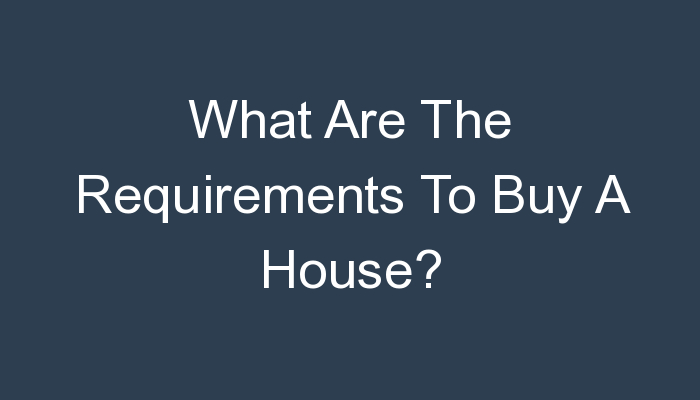The prospect of buying a home can be exciting, but it’s important to equip yourself with the right knowledge before taking the plunge. There are many different requirements to consider when purchasing a house, and understanding them all is paramount in ensuring that you don’t encounter any unexpected surprises during the buying process.
In this blog post, we will discuss the basic requirements for buying a house. From getting your finances in order to researching neighbourhoods and finding the right real estate agent, we will cover all of the basics of home ownership.
How much money you’ll need
You’ll need to have a down payment of at least 3.5% of the purchase price of the home. In addition, you’ll need to have enough money saved up for closing costs, which are typically around 2% of the purchase price of the home.
Good credit
There are a few key requirements you’ll need to meet in order to qualify for a mortgage and buy a house. One of the most important is having good credit. A good credit score indicates to lenders that you’re a responsible borrower who is likely to repay your loan on time.
This can help you secure a lower interest rate on your mortgage, which can save you thousands of dollars over the life of your loan. To get a good credit score, make sure to pay all of your bills on time and keep your balances low on your credit cards. You can also check your credit report for any errors that may be dragging down your score.
A steady income
If you’re looking to buy a house, one of the first things you’ll need to consider is whether or not you have a steady income. A stable job with a good salary is typically one of the requirements needed in order to qualify for a mortgage. Lenders will want to see that you have a history of steady employment and income before they’ll give you a loan.
So, if you’re thinking of buying a house, make sure you have a solid job with consistent income first. This will give you the best chance at qualifying for a mortgage and getting the home of your dreams.
A down payment
A down payment is the initial payment you make when you purchase a home. It is typically a percentage of the home’s purchase price, and it is paid to the seller at the time of sale. The size of your down payment will affect the total amount you pay for your home, as well as your monthly mortgage payments.
If you are looking to purchase a home, you will need to save up for a down payment. The average down payment in the United States is 20% of the home’s purchase price. This means that if you are looking to buy a $200,000 home, you will need to have $40,000 saved up for your down payment.
There are a few ways to come up with the money for a down payment. You can use savings from your personal bank account, or you can get help from family and friends. You can also look into government programs that offer assistance with down payments, such as the Federal Housing Administration (FHA) loan program.
Once you have saved up enough money for your down payment, you will need to decide how you want to pay it. You can write a check directly to the seller, or you can work with a real estate agent to put together a contract for financing. If you are financing your home through a bank or mortgage lender, they may require that your down payment be in the form of cash or cashier’s check.
Mortgage pre-approval
If you’re in the market for a new home, one of the first steps you should take is to get pre-approved for a mortgage. Mortgage pre-approval gives you an estimate of how much you can borrow and can lock in an interest rate for a set period of time, usually 60 to 90 days.
Pre-approval is different from pre-qualification, which gives you a general idea of how much you could borrow based on information you provide about your income, debts and assets. Pre-approval is more specific and can help sellers take your offer more seriously.
To get pre-approved, most lenders will require that you:
-Provide proof of income, such as pay stubs or tax returns
-Show evidence of employment
-Supply bank statements and investment account statements
-Have a good credit score
You may also be asked to provide additional documentation, such as explanations for any large deposits or withdrawals from your accounts. Once you have all the required documentation, the lender will review your financial history and make a decision about whether or not to approve your loan.
Choose the right home
There are a number of factors to consider when choosing the right home to buy. The first is your budget. How much can you afford to spend on a home? The second is your needs. What kind of home do you need in order to live comfortably? The third is your location. Where do you want to live? The fourth is your lifestyle. Do you want a home that is close to amenities or do you prefer a more rural setting? All of these factors will help you narrow down your search for the perfect home.
Conclusion
In order to purchase a house, there are a variety of requirements that need to be met. Having good credit and income as well as saving some money for the down payment are all important measures that help demonstrate financial responsibility.
It is also important to consider your debt-to-income ratio and have an emergency fund ready in case you encounter unexpected expenses along the way. With careful planning, home buying can be made easier by understanding these essential requirements before beginning the process.

